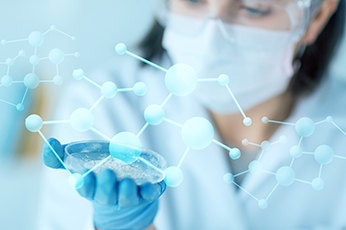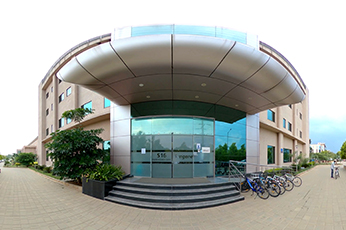Developing pharmaceutical formulations for oral solid, liquid, parenteral, and semi-solid dosage forms
Syngene provides pharmaceutical formulation development services for various dosage forms using state-of-the-art infrastructure and an expert team with diverse experience. Our end-to-end services extend from early-phase product development to clinical supplies for new chemical entities, generics, and life cycle extension products such as 505(b)2.
Capabilities
We develop formulations using pre-formulation data that helps us design prototype formulations and processes. Our experts offer formulation services for oral solid dosage forms, including tablets, capsules, and sprinkles for pediatric population. The tablet formulations include immediate-release conventional tablets, modified-release matrix and functionally coated tablets, and bilayer tablets. The capsules include drug-in-capsule for first-in-human (FIH) clinical studies, formulated capsules with powder blend or granules, modified-release capsules with beads or mini tablets, and liquid-filled hard gelatin capsules.
Our oral liquid dosage forms include solution, ready-to-use and powder-for-suspension, emulsions, and micro-emulsions. In parenteral dosage forms, we develop ready-to-use liquid and lyophilized formulations for intravenous, intramuscular and subcutaneous administration, pre-filled syringes, and oncology injectables. The team is also well-versed with creating formulations for semi-solids dosage forms such as ointments, creams, and gels used for topical application.
Infrastructure
Our formulation development center includes validated stability chambers for conducting stability tests that support the selection of a lead and back-up formulation. The laboratory includes state-of-the-art equipment that enables us to develop pharmaceutical formulations for both oral solids and parenteral.
Formulation Development facilities for oral solids
Our facilities to develop oral solids include V, octagonal, and double cone blenders with a capacity of 0.5 – 50 kilograms, bottom-driven high shear mixer with a capacity of 1 to 10 kilograms and 5 to 30 kilograms, and a Glatt fluid bed dryer with Wurster column and a capacity of 0.5 to 1 kilogram and 4 to 15 kilograms. Our facilities also include Alexanderwerk WP120’s roller compactor and mini compactor that can process a minimum batch of 200 grams in continuous operation. We have 10 to 20 stations for compression machines of the instrumented rotary press type, spray dryer that can handle 100 to 150 grams/hour, auto coater with a capacity to produce 0.2 to 1 kilogram and 5 to 12 kilograms, and Pam AF25T and Rimek-Minicap’s continuous motion automatic capsule filling machine.
Our experts use several instruments for in process quality control (IPQC) tests such as disintegration, friability, hardness, tap density, and gradation or sieve analysis. The IPQC instruments also include density analyzers such as AcuPyc and Geopyc as well as powder flowability testing systems such as Erweka GT.
Formulation Development facilities for parenteral
Our facilities for developing parenteral formulation include equipment such as VirTis Genesis lyophilizer with a 25 liters condenser capacity, counter pressure autoclave with 80 liters capacity, and Microfluidizer 110EH high pressure homogenizer. We are also equipped with IKA Ultraturrax’s T25 and T50 high shear mixer, Instron PFS functionality tester, Masterflex dosing pump, Rotavapor Buchi’s rotary evaporator, and Bectochem isolator. The facility includes pressure vessels with five and ten liters capacity, head space oxygen analyzer, and microelectrode pH and DO meter.
505(b)(2) Drug Product Development
One-stop solution for drug product development using 505(b) (2) route
Many companies are electing to pursue 505(b)(2) applications in recent times to obtain new drug approvals. The pathway is designed to streamline the approval of drugs based on pharmacological agents that have already been approved. New product opportunities for previously approved compounds could be based on the following approaches:
- Developing a new dosage form for an already approved compound
- An alternative route for administration
- Development of intermediate strengths
- New drug combinations
- Altering the pharmacokinetic profile to achieve enhanced therapeutic effect
- Increasing the bioavailability to have reduced food effect or reduced dose intake
- Conversion of prescription to over the counter drugs and even prodrugs
Syngene is a one-stop solution for drug product development using the 505(b)(2) route for all of the above approaches. We have significant experience in 505(b)(2) product development and can support you in efficiently turning your innovative ideas into successful products. Our development capabilities in this space range from ideation, dosage design, and PK profile selection to establishing proof-of-concept, formulation development, process development, stability, scale-up, and clinical studies.
Further, products developed using the 505 (b) (2) route does not require duplicate studies to be carried out since they are based on previously-approved ‘reference’ drugs, resulting in substantial savings on costs and time. Once approved, the drug would enjoy three to seven years of market exclusivity.
With Syngene, you can rest assured that you have selected the right reference product and the relevant reference data, which is critical to developing a successful 505(b) (2) drug product.
Our service portfolio
Figure1: Our service portfolio for 505(b)(2) drug product development
Our key differentiators
- Extensive expertise in formulation development across multiple formulation types (liquids, modified-release tablets/capsules, multi-drug combinations, nanoemulsions, sterile lyophile powders, pre-filled syringes)
- End-to-end capabilities starting from the identification of unmet medical needs to ideation, concept note creation, the establishment of proof of concept, registration batch manufacturing, ICH stability, pilot and pivotal clinical studies, regulatory query support, and commercialization (post product approval)
- Phase-appropriate quality systems based on the current development phase with provision for implementing regulatory requirements as the drug moves through the commercialization process
- FDA-approved quality systems and manufacturing facility to develop clinical and registration batches as well as process validation and commercial batches
- On-site vivarium to carry out rodent and dog PK (out-sourced) trials, including own bioanalytical lab for fast-paced screening of early prototypes
- Toxicology, bioanalytical, analytical, and clinical development capabilities to address program-specific toxicity and clinical trial requirements



